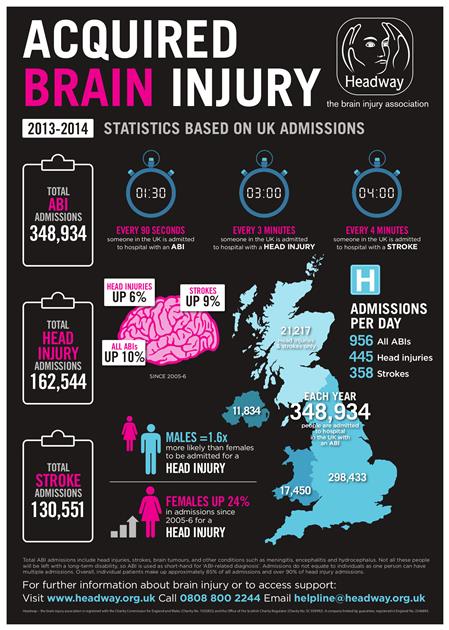Hi all,
It's ABI Week this week, and we've released our statistics into acquired brain injury (ABI) hospital admissions.
The results are extremely concerning, showing that brain injury admissions have risen by 10% since 2005-6. Here's a summary of some of the key findings:
- There were 348,934 UK admissions to hospital with acquired brain injury in 2013-14. That is 566 admissions per 100,000 of the population.
- ABI admissions in the UK have increased by 10% since 2005-6.
- There were approximately 956 ABI admissions per day to UK hospitals in 2013-14 - or one every 90 seconds.
- In 2013-14, there were 162,544 admissions for head injury. That equates to 445 every day, or one every three minutes.
- Men are 1.6 times more likely than women to be admitted for head injury. However, female head injury admissions have risen 24% since 2005-6.
- In 2013-14, there were 130,551 UK admissions for stroke. That is an increase of 9% since 2005-6 and equates to one every four minutes.
We hope these new stats will improve awareness of the condition, and assist in calling for improved care and support for people with brain injury.
You can find out more on our website, headway.org.uk/news/female-...
Alternatively, check out #ABIWeek on Facebook and Twitter.
Wear your hat for Headway!
Tomorrow (Friday 22nd May) is Hats for Headway Day!
It's a simple way to support Headway while having a little fun. All we ask you to do is wear a hat for the day (crazy/wacky headgear is always welcome) in return for a donation to Headway.
The best individual photo will win a great prize - a signed script from Coronation Street's 50th anniversary live show!
Find out more at headway.org.uk/hats-for-hea...
To enter the competition, share on Facebook or Twitter using #HatsForHeadway or submit your photos using the form on the above page. We look forward to seeing you in your finest headgear 
As always, a big thanks to all of you for your support.
Best wishes,
Headway
